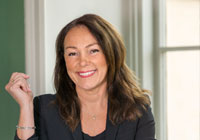
SCAS News - 28 August, 2023
A Message from SCAS Principal Christina Garsten
The Principal's Note
28 August, 2023
New Encounters - New Ideas
With the start of the academic year of 2023-24, we are happy and proud to welcome a new group of
Fellows to the Collegium. Arriving from countries and universities across the world, our Fellows bring
with them expertise, experience, perspectives, and ideas that will inspire and motivate not only the group
of Fellows themselves, but also scholars and intellectuals well beyond our premises. Encounters between
scholars of various disciplines will generate conversations, debates, insights, and novel questions that may
lead to unexpected findings, breakthroughs, or innovations. Oftentimes, seeds to new projects are grown,
collaborations emerge, and new friendships cultivated.
The excitement of receiving a new group of Fellows is manifold. One may anticipate a year of learning
and
broadening of scholarly perspectives. Yet, one can never foresee what topics that will take hold amongst
the Fellows, nor how the social dynamics will unfold. This built-in unknown is also what excites us at the
Collegium. Each new academic year is in many ways also a new start.
With Fellows free to engage in their own research interests, the topics of this academic year cover a broad
spectrum. We will learn about the intersection of the financial and the digital in property markets; how
genetics and race have become imbricated in historical understandings; implicit gender biases among uni-
versity students; sexual and reproductive health and rights policies in maternal and child care in post-
socialist Ukraine; hopes, dreams and disappointments among women in Britain; the moral economy of
drug development; the uptake and use of constructed languages in 20th century linguistics, and the net-
work of neoliberal think tanks and their role in influencing climate policy – just to mention a few topics.
Based on our academic profile and the interests of our Fellows, we organize not only open seminars, but a
lso workshops and colloquia around topics of special interest and relevance. Over the next few months,
we will be hosting an entire week of encounters on the topic of academic freedom and democracy in higher
education, under the label DARE. This topic has risen to prominence over the past few years, with increasing
restrictions placed on the free and unrestricted pursuit of knowledge, illustrating the tension between inquiry
and power globally.
Furthermore, we will be hosting a workshop on timber colonialism, exploring the dynamics of colonial
systems based on natural resource extraction by focusing on forest exploitation. The workshop aims to
contribute to a critical understanding of the global interconnectedness of natural resource extraction and
consumption. Yet other workshops and events may and will – take place, and will be announced on our
website.
We will continue our commitment to networking with other institutes for advanced study and other research
organizations to strengthen our ties and collaborations across the world. The furthering of our academic pro-
file and commitment to free academic inquiry and curiosity-based research benefit significantly from regular
interactions with our European partners in the international network SIAS; the European NetIAS network;
and
the recently formed Nordic NordIAS network.
In our efforts to promote academic networking and interaction across borders, the interdependence of free
research and democracy cannot be emphasized enough. The role of research as bearer of fundamental aca-
demic values in a global context is more important today than ever before, as politics in many countries across
the world are moving in an authoritarian direction, and as democracy is threatened by war. This situation em-
phasizes the need to nurture international cooperation, and to reflect on how we can maintain and nurture
collaboration to strengthen the free pursuit of knowledge and democracy. Our Collegium rests on the idea that
investments in long-term basic research and education are essential in their contribution to a better, more
humane,
and sustainable future.






